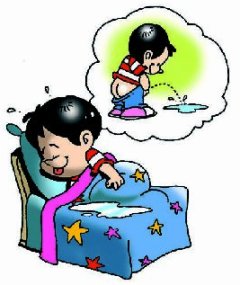
Maybe we all already know the meaning of the word 'wet', ie the discharge of urine without realizing it while sleeping at night. This habit is often viewed negatively, although at a certain age, bedwetting is considered normal.
Not least due to wetting or non-functioning of two mechanisms:
1. Antidiuretic hormone cycles. This hormone is useful to suppress the production of urine. Released by the body usually starts at dusk, so the amount of urine at night is reduced.
2. Full bladder sensation. The sensation is strong enough to be able to wake the child during sleep to then pee in the shower or toilet.
If one or both of the above mechanisms are well under way, the child does not wet anymore. In most children, the mechanism is just beginning to develop at age 2-6 years.
Cause
The habit of bedwetting is most often caused by:
1. Delayed development of nerve fibers.
2. Genetic. If both parents are not pengompol, the child becomes pengompol only 15%. If one parent at a time when his little habit of wetting, their child may wet the bed 44%. If both parents had been pengompol, his son had the opportunity to follow in their footsteps with a 77% chance.
Although rare, bedwetting can also be caused by:
1. Infectious diseases, such as urinary tract infections.
2. Anatomical disorders, such as small-sized bladder.
3. Impaired production of antidiuretic hormone.
4. Psychological problems, such as death in the family, sexual harassment, or violence against children.
5. Constipation, which is not defecate for days.
6. ADHD, attention deficit hyperactivity disorder.
Normal
At the age of 1-2 years, bladder began to swell and the child begins to feel the full sensation in the bladder. At the age of 2-3 years, children begin to 'dry' during the day. At the age of 4-5 years, children begin to be able to control the urine as well as adults, and began to wet again. Most young girls begin to really do not wet the age of 6 years, while the boys at the age of 7 years.
Treatment
Bedwetting treatment is usually not performed before the child's age 6 or 7 years. Expected at this age, bedwetting is gone by itself.
Bedwetting treatment options for children include:
1. Motivation therapies, such rewarding when children do not wet anymore.
2. Bedwetting alarms. If the child starts bedwetting, alarm mounted on a pair of children will ring / vibrate. Thus, the child immediately woke up and holding the rest of the urine to be thrown in the bathroom or toilet.
3. Providing drugs such as desmopressin or tricyclic depressants.
In addition, children should get used to peeing in advance, and do not drink before bed.
Not least due to wetting or non-functioning of two mechanisms:
1. Antidiuretic hormone cycles. This hormone is useful to suppress the production of urine. Released by the body usually starts at dusk, so the amount of urine at night is reduced.
2. Full bladder sensation. The sensation is strong enough to be able to wake the child during sleep to then pee in the shower or toilet.
If one or both of the above mechanisms are well under way, the child does not wet anymore. In most children, the mechanism is just beginning to develop at age 2-6 years.
Cause
The habit of bedwetting is most often caused by:
1. Delayed development of nerve fibers.
2. Genetic. If both parents are not pengompol, the child becomes pengompol only 15%. If one parent at a time when his little habit of wetting, their child may wet the bed 44%. If both parents had been pengompol, his son had the opportunity to follow in their footsteps with a 77% chance.
Although rare, bedwetting can also be caused by:
1. Infectious diseases, such as urinary tract infections.
2. Anatomical disorders, such as small-sized bladder.
3. Impaired production of antidiuretic hormone.
4. Psychological problems, such as death in the family, sexual harassment, or violence against children.
5. Constipation, which is not defecate for days.
6. ADHD, attention deficit hyperactivity disorder.
Normal
At the age of 1-2 years, bladder began to swell and the child begins to feel the full sensation in the bladder. At the age of 2-3 years, children begin to 'dry' during the day. At the age of 4-5 years, children begin to be able to control the urine as well as adults, and began to wet again. Most young girls begin to really do not wet the age of 6 years, while the boys at the age of 7 years.
Treatment
Bedwetting treatment is usually not performed before the child's age 6 or 7 years. Expected at this age, bedwetting is gone by itself.
Bedwetting treatment options for children include:
1. Motivation therapies, such rewarding when children do not wet anymore.
2. Bedwetting alarms. If the child starts bedwetting, alarm mounted on a pair of children will ring / vibrate. Thus, the child immediately woke up and holding the rest of the urine to be thrown in the bathroom or toilet.
3. Providing drugs such as desmopressin or tricyclic depressants.
In addition, children should get used to peeing in advance, and do not drink before bed.